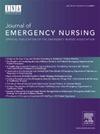与急诊护士职业倦怠和工作投入相关的工作相关因素:为以系统为重点的干预措施提供依据。
IF 1.8
4区 医学
Q2 EMERGENCY MEDICINE
引用次数: 0
摘要
简介急诊科护士的职业倦怠率很高。本研究旨在确定影响急诊科护士幸福感的工作相关因素:这项横断面研究通过多种方法收集数据。匿名调查用于收集急诊护士对工作环境的看法、自我报告的幸福感结果以及人口统计学特征。行政和电子健康记录数据用于收集团队和急诊室层面的变量。数据分析采用了描述性统计、线性模型和拉索回归法:结果:53%(n = 175/337)的受访急诊护士表示职业倦怠程度较高。高水平的心理安全与较低水平的职业倦怠(P < .05)和较高的工作参与度(P < .05)相关。对适当补偿的看法与职业倦怠成反比(P < .01)。来自患者(P < .01)和同行(P 讨论)的工作场所暴力与职业倦怠呈负相关:为了提高急诊护士的幸福感,以系统为重点的干预措施应解决护士的报酬、急诊室团队的心理安全、工作场所暴力以及组织对护士有意义的认可和幸福感支持等问题。本文章由计算机程序翻译,如有差异,请以英文原文为准。
Job-Related Factors Associated with Burnout and Work Engagement in Emergency Nurses: Evidence to Inform Systems-Focused Interventions
Introduction
Nurses working in the emergency department experience high rates of burnout. The purpose of this study was to determine job-related factors affecting the well-being of emergency nurses.
Methods
In this cross-sectional study data were collected through multiple methods. An anonymous survey was used to collect data on emergency nurses’ perceptions of the work environment, self-reported outcomes of well-being, and demographic characteristics. Administrative and electronic health record data were used to collect team and ED-level variables. Descriptive statistics, linear models, and Lasso regression were used to analyze data.
Results
Fifty-three percent (n = 175/337) of responding emergency nurses reported high burnout. High levels of psychological safety were linked to lower levels of burnout (P<.05) and increased work engagement (P<.05). Perceptions of adequate compensation were inversely associated with burnout (P<.01). Workplace violence from patients (P<.01) and peers (P<.001) was associated with higher levels of burnout, and workplace violence from peers was associated with lower levels of work engagement (P<.05). Recognition (P<.05) and well-being support from the organization (P<.01) were associated with higher levels of work engagement.
Discussion
To improve emergency nurse well-being, systems-focused interventions should address nurse compensation, psychological safety among the ED team, workplace violence, and meaningful recognition of nurses and well-being support from the organization.
求助全文
通过发布文献求助,成功后即可免费获取论文全文。
去求助
来源期刊
CiteScore
3.10
自引率
11.80%
发文量
132
审稿时长
46 days
期刊介绍:
The Journal of Emergency Nursing, the official journal of the Emergency Nurses Association (ENA), is committed to the dissemination of high quality, peer-reviewed manuscripts relevant to all areas of emergency nursing practice across the lifespan. Journal content includes clinical topics, integrative or systematic literature reviews, research, and practice improvement initiatives that provide emergency nurses globally with implications for translation of new knowledge into practice.
The Journal also includes focused sections such as case studies, pharmacology/toxicology, injury prevention, trauma, triage, quality and safety, pediatrics and geriatrics.
The Journal aims to mirror the goal of ENA to promote: community, governance and leadership, knowledge, quality and safety, and advocacy.

 求助内容:
求助内容: 应助结果提醒方式:
应助结果提醒方式:


